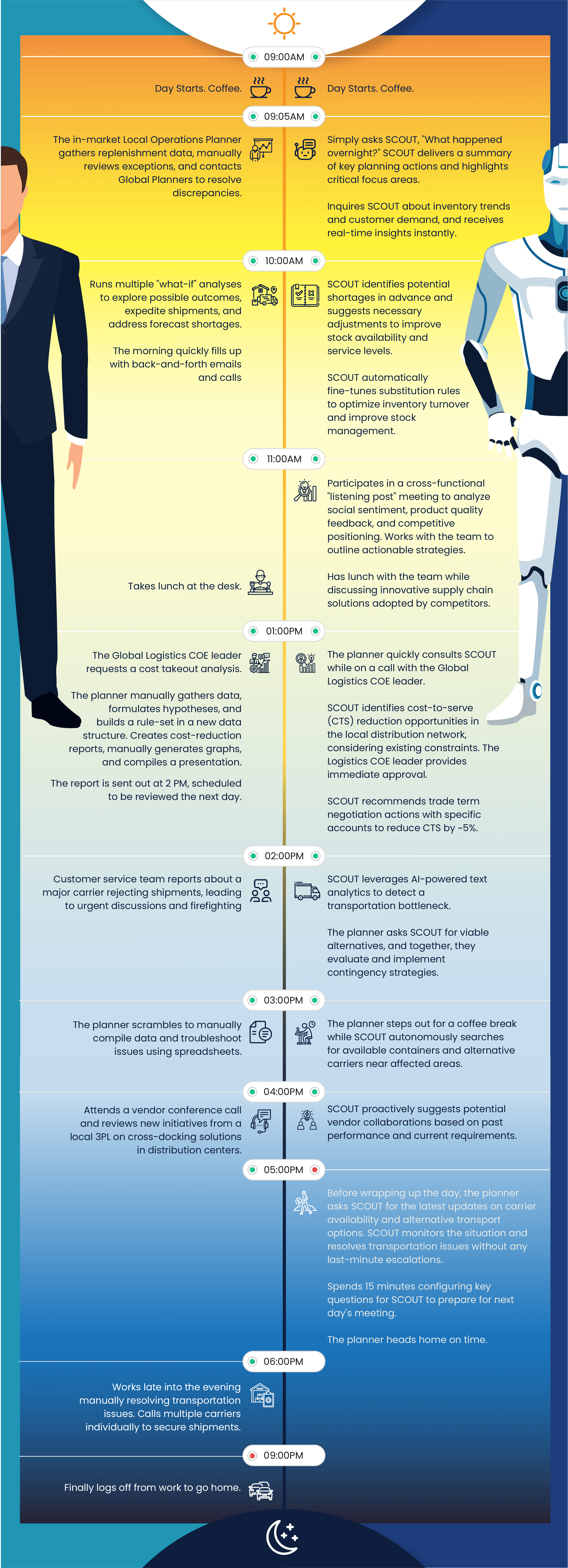How Agentic AI Transforms Supply Chain Planning
In today’s fast-paced supply chain environment, planners are constantly juggling data, disruptions, and decision-making—often relying on manual processes and fragmented tools. Agentic AI is transforming this dynamic by introducing AI-driven orchestration, enabling real-time decision-making, predictive analytics, and seamless collaboration.
This infographic presents a before-and-after view of a supply chain planner’s day, showcasing the transformation with AI SCOUT (Supply Chain Orchestration and Unification Tower). See how Agentic AI reduces manual effort, streamlines workflows, and empowers planners to shift from reactive firefighting to proactive strategy.

Sales Intelligence for Revenue Growth
Need:
Traditional sales forecasting methods struggle with the complexity of multiple stakeholders involved in decision-making.
Role of AI:
AI-powered predictive analytics integrate historical sales data, market demand signals, and macroeconomic factors to map historical patterns with external factors such as regulatory shifts, competitor actions and hospital purchasing cycles to forecast demand accurately.
ML models can dynamically segment customer accounts based on purchasing behavior, prescribing trends, and institutional affiliations, enabling sales teams to focus on high-value opportunities.
NLP based sentiment analysis tracks physician feedback, market perception, and emerging competitor intelligence that enable real-time campaign optimization across levers like content, formats, channels and timings.
Impact Realized:
- Increased revenue predictability and optimized territory planning
- Minimized stockouts and inventory holding costs
- Enhanced salesforce productivity with data-backed engagement strategies
HCP Targeting and Engagement
Need:
Engaging the right healthcare professionals (HCPs) and Key Opinion Leaders (KOLs) requires a deep understanding of prescribing behaviors, treatment adoption trends, and institutional purchasing patterns.
Role of AI:
AI-powered segmentation models analyze real-world data from claims, EHRs, clinical trial publications, and digital interactions to identify KOLs and physicians actively engaged in specific therapeutic areas. These insights help commercial teams to personalize engagement and outreach strategies.
ML-driven analytics assess HCP preferences, past interactions, and market trends to recommend the most effective engagement channels—email, in-person meetings, webinars, or digital platforms for timely communication.
Impact Realized:
- Higher engagement rates with KOLs and high-value HCPs
- Improved sales efficiency through AI-assisted rep call planning
- Personalized content and messaging based on HCP interactions
Dynamic Pricing & Contract Optimization
Need:
MedTech pricing models must balance regional reimbursement constraints, hospital procurement policies, and value-based pricing expectations.
Role of AI:
AI-driven contract intelligence platforms analyze historical deal data, payer reimbursement trends, and competitor pricing strategies to generate optimized pricing strategies that reduce revenue leakage.
ML algorithms continuously adjust pricing recommendations based on real-time inputs, such as procurement negotiations and regional cost variations. It also identifies pricing anomalies in contracts, ensuring adherence to regulatory guidelines while maximizing profitability.
Impact Realized:
- Increased contract win rates with data-driven pricing recommendations
- Reduced revenue leakage from suboptimal pricing and rebates
- Improved compliance with region-specific reimbursement regulations
Proactive Compliance & Risk Management
Need:
With increasing regulatory scrutiny by global health authorities on remote monitoring solutions, and digital therapeutics, MedTechs must adopt practices to remain compliant.
Role of AI:
AI automates compliance monitoring by scanning FDA, EMA, and other regulatory databases for new guidelines, approval requirements, and safety warnings.
ML-based document intelligence extracts key risk indicators from regulatory submissions, ensuring that compliance teams proactively address potential issues before audits or product approvals.
Impact Realized:
- Reduced time-to-market for new product approvals
- Minimized compliance risk and regulatory penalties
- Enhanced transparency in AI-driven decision-making
Connected HCP and Patient Support
Need:
Traditional support models are resource-intensive and reactive that leads to delays in issue resolution, lower patient adherence, and suboptimal customer experiences.
Role of AI:
Conversational AI and NLP-based virtual assistants streamline customer and patient support by automating inquiries, troubleshooting product issues, and providing real-time responses to HCPs.
AI models analyze historical service requests to predict potential technical failures or usage concerns to enable proactive resolution.
AI also personalizes patient adherence programs by identifying behavioral patterns that indicate a risk of non-compliance with post-surgical or therapeutic protocols.
Impact Realized:
- Reduced customer support workload for MedTech field teams
- Improved patient adherence and post-surgical outcomes
- Increased HCP satisfaction with real-time AI-driven insights
Supply Chain & Inventory Management
Need:
MedTech supply chains are highly complex and vulnerable to disruptions due to multiple factors. Inefficient operations can impact both patient care and business performance.
Role of AI:
AI-driven supply chain optimization uses predictive analytics to analyze supplier performance, demand variability, and geopolitical risks affecting logistics.
ML models detect inefficiencies in procurement, flag potential disruptions, and recommend adjustments to maintain optimal stock levels.
AI-powered RPA enhances warehouse operations by automating order processing, replenishment, and shipment tracking.
Impact Realized:
- Reduced supply chain costs and order fulfilment delays
- Increased visibility into supplier performance and risk factors
- Improved demand-supply alignment for surgical devices and consumables

